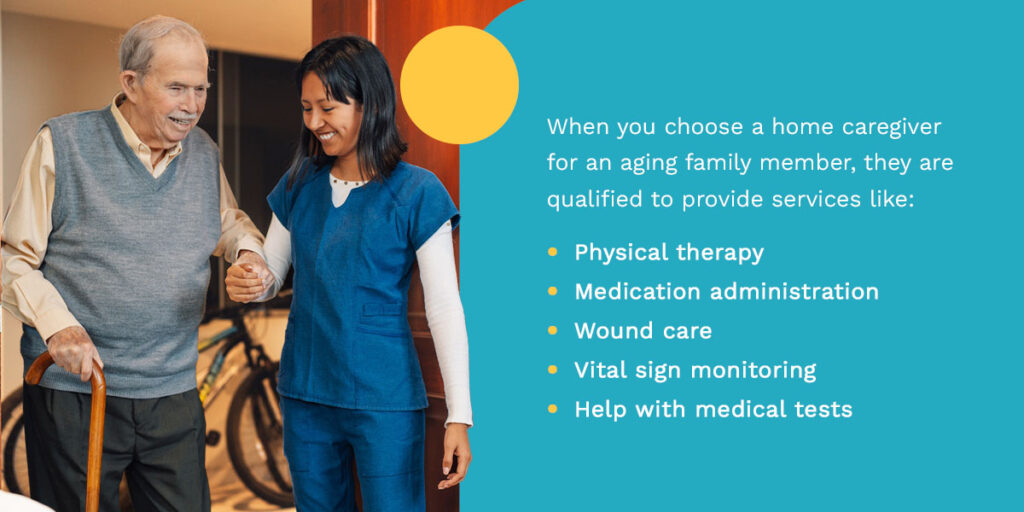Exploring the 4 Most Common Types of Caregivers

Many people refer to the word “caregiver” as anyone who gives help to another. While this definition offers a solid foundation, not all caregivers are alike. Each one often has distinct roles shaped by their skills and the specific requirements of the person they support. Understanding these differences can help you make an informed choice about your family member’s care options for assistance at home..
To help you understand the vast world of caregiving, we’ve outlined four of the most common types of caregivers you’re likely to encounter. If you’re searching for a caregiver for yourself or a relative, you may find a perfect fit among these descriptions.
The Importance of Professional Caregivers
If you are a family caregiver, you likely want to give your family member the best care possible, but you may feel like you don’t have the time and resources to fully support them. That’s where professional caregivers can step in, helping you provide the quality care and support they deserve. Caregiver duties and responsibilities can include:
- Personal care: Assisting at home with daily activities like bathing, dressing and grooming.
- Medication management: Ensuring that medications are taken on time and as prescribed.
- Meal preparation: Planning and preparing healthy meals tailored to dietary needs.
- Transportation: Driving older adults to appointments, social events or grocery shopping.
- Emotional support: Providing companionship and emotional reassurance to alleviate loneliness.
Family caregivers make up the backbone of the healthcare system, offering invaluable assistance so adults can age in the comfort of their homes. Their dedication can improve your family member’s quality of life and foster a deeper connection throughout your family.
4 Examples of Caregivers and Their Responsibilities
The exact care your relative receives will depend on the caregiver you hire. From private-duty caregivers to home health and virtual assistants, here are the four main types of caregivers and their duties:
Family Caregivers: Supporting Older Adults With Care
Family caregivers have played an essential role in society for centuries. As the name implies, these caregivers are family members who assist their relatives. For instance, a 40-something daughter may serve as a caregiver to her aging mother who needs help with activities like grooming, bathing or shopping.
Family caregivers may or may not be volunteers. In some cases, they earn their living by being a full-time caregiver. In other cases, they may only spend part of the time caring for a relative. Unless they’re medically trained and appointed to serve in a medical capacity, they do not deliver any kind of formal home health care services.
If you are a family caregiver, you know that it can be a rewarding yet challenging role. Whether you’re assisting at home with bathing, driving to appointments, cooking meals, or medication reminders, many caregivers juggle these tasks with work, which can lead to burnout and social isolation.
Private-Duty Caregivers: Professional In-Home Assistance
If a family member is unable to provide care, a private-duty caregiver with a medical or nursing background may come into the house. With in-home assistance, professionals help older adults age safely while providing care in the place they are most comfortable.
Private-duty caregivers are hired through trusted outside sources, such as home care and care management services providers like Corewood Care. The family usually works with the private-duty caregiver to determine a customized schedule. Some private-duty caregivers stay throughout the night, while others concentrate their attention on care during the day.
Some families employ more than one private-duty caregiver, especially if they prefer round-the-clock (or nearly round-the-clock) assistance. Depending on the type, private caregiver duties and responsibilities can include:
- Personal care assistance: This includes bathing, dressing and transferring.
- Companionship: Private-duty caregivers do more than assist your relative with daily activities. They can be a companion for conversation, affection and friendship.
- Help with daily tasks: These are typically general tasks like laundry, meal preparation and light housekeeping.
- Memory care: Private-duty caregivers may provide Alzheimer’s and memory care for aging adults with dementia.
- Transportation services: Professionals will help your family member when they want to get out of the house or need to travel to and from appointments.
Private caregiving might also consist of daily programs that keep older adults active and engaged, whether that’s exercise or participating in their favorite hobby. These professionals might assist you full-time or provide temporary respite care so you can rest and recoup.

Home Health Caregivers: Temporary Medical Support at Home
It’s a common misunderstanding that individuals who need a caregiver today will need one in the future. Consider home health care caregivers. Generally speaking, they’re paid for entirely or partially by insurance to provide anything from physical therapy to home-based nursing.
Someone recovering from an accident or illness may see a home health care caregiver two or three times weekly. Though this type of caregiver can assist with anything from cooking to cleaning, their role is temporary. Ideally, the individual will improve to the point where the home health care caregiver is no longer necessary.
Home health caregivers are usually registered, licensed nurses or physical or occupational therapists. When you choose a home caregiver for an aging family member, they are qualified to provide services like:
- Physical therapy: Home health caregivers can help older adults regain their mobility and strength after surgery or an injury. They’ll design an exercise program to improve balance, coordination and overall physical function.
- Medication administration: These professionals are trained to administer medications safely and correctly, making sure your family member takes the right dosage at the correct times.
- Wound care: This includes changing dressings, cleaning wounds and monitoring for signs of infection. These caregivers will ensure any surgical sites or chronic wounds heal properly while providing recovery care.
- Vital sign monitoring: Home health professionals can monitor older adults’ health status, including vital signs like blood pressure, heart rate, temperature and respiratory rate. With ongoing checks, they can identify any health changes that call for medical attention.
- Help with medical tests: These professionals can help your family member prepare for medical tests like blood draws or diagnostic imaging. They can explain these procedures and make sure they are comfortable and informed.
It’s important to keep an open dialogue with home health caregivers about your relative’s progress. They can design a care plan to help your family member recover and return to their usual daily activities.
Virtual Caregivers: Remote Support and Companionship
Virtual caregivers can provide companionship from afar. While they might not be able to help someone put on an outfit or go to the store, they can act as a friendly face. Though virtual caregiving is in its infancy, it’s likely to become more popular with the rise in telehealth and telemedicine.
As technology continues to advance, virtual caregivers are becoming more equipped to provide meaningful interactions and support. Virtual caregivers can chat and check in with your family members through ongoing video calls, offering companionship and engagement.
They can also help with medication reminders and appointment scheduling, ensuring that your relative stays on track with their health care needs. Some technologies can track their health metrics, such as heart rate and activity levels, allowing virtual caregivers to alert you when needed. Some virtual caregivers follow a hybrid model so they can make periodic physical assessments.
Virtual caregivers can also promote better social connections by arranging virtual family gatherings or connecting your family member with community programs, helping them maintain a sense of belonging.
How to Choose the Right Type of Caregiver
Choosing the right caregiver for your aging relative is an important decision. Consider the following factors to help with your decision:
- Care needs: Startby evaluating your relative’s specific needs. Do they need help with daily activities like bathing or dressing? Do they require assistance with medical needs? Or are they just looking for a companion? Understanding their needs will help you determine whether a family caregiver, private-duty caregiver, home health caregiver or virtual caregiver is the best fit.
- Level of independence: If your family member is mostly independent but needs occasional support, a virtual caregiver might be the best fit. However, if they need more hands-on care, you might opt for a private-duty or home health caregiver.
- Available resources: Consider your budget and available resources. Some caregivers are covered by insurance, while others might require an out-of-pocket payment. Make sure the caregiver you choose fits your family’s financial plan.
- Qualifications and experience: If you choose a home health caregiver, ensure they have proper licenses and certifications. For private-duty caregivers, ask about their experience and training. A background check can also provide peace of mind.
Most importantly, trust your instincts when evaluating the types of caregivers and choosing one for your family member. Meet with potential candidates and make sure they’re compatible with your relative. A strong rapport can lead to a more positive caregiving experience. By considering these factors, you can make a better decision that ensures your parent or relative receives the best possible care.

Turn to Corewood Care for Professional Support and Companionship
Now that you have more information on caregivers, you can consider which type is best suited for yourself or your family member’s needs.
At Corewood Care, our multidisciplinary team includes licensed professionals who can provide skilled home health services, medication management and wellness calls tailored to your family member’s exact needs. With a focus on technology, our integrated care management model enhances the care experience, ensuring seamless communication and collaboration among caregivers.
Feel free to schedule a free assessment at Corewood Care in Maryland, North Virginia or Washington, D.C. We’ll help you explore your caregiving choices to pick the appropriate fit.



